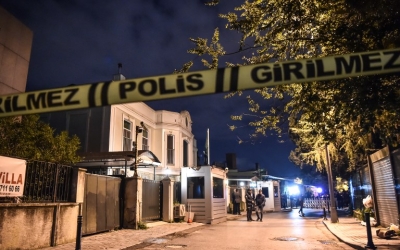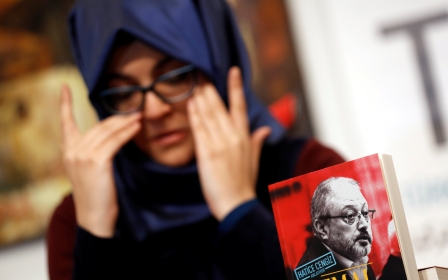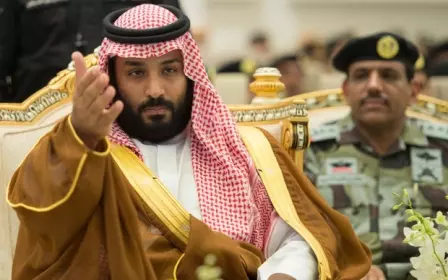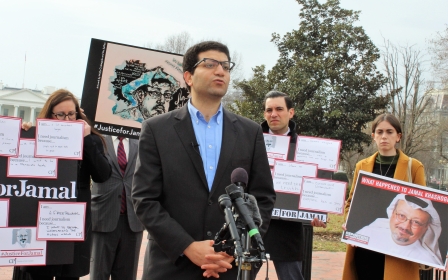REVEALED: Jamal Khashoggi's appeal for unity between Saudi and Iranian people
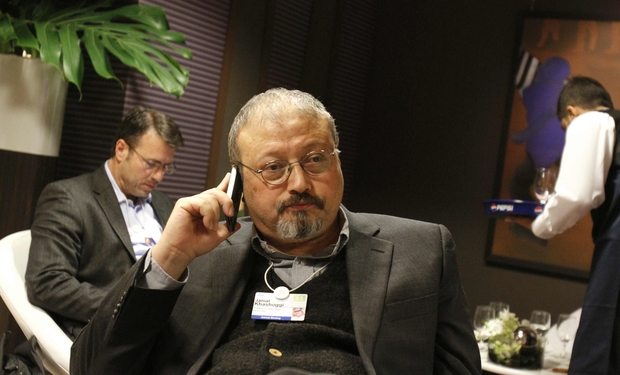
Jamal Khashoggi was working to promote reconciliation between the Saudi and Iranian people prior to his murder in the Saudi consulate in Istanbul last October, Middle East Eye can reveal.
In an unfinished opinion article drafted early in 2018 by the exiled Saudi journalist in collaboration with a leading Iranian human rights activist, Khashoggi called for civil society organisations in both countries to be “voices of reason and moderation” even as their governments risked open conflict.
New MEE newsletter: Jerusalem Dispatch
Sign up to get the latest insights and analysis on Israel-Palestine, alongside Turkey Unpacked and other MEE newsletters
The article called on leaders in Riyadh and Tehran to “stop meddling in the internal affairs of other countries”, citing the death and devastation caused by both countries’ involvement in wars in Syria and Yemen, and to start respecting human rights.
“Our governments are stuck digging in their heels in a dangerous staring contest that may soon erupt into something worse,” Khashoggi wrote.
“It is up to our people to be the voices of reason and moderation – something both our peoples take pride in… Civil society should spearhead this effort at mutual understanding among our peoples.”
MEE is publishing the final draft of the article with the permission of the Iranian rights activist, who ultimately declined to put his name to a joint piece, but gave consent for Khashoggi to publish it under his own byline.
The content of the article was agreed over the course of a three-hour meeting and a subsequent exchange of emails during December 2017 and January 2018, according to a friend of Khashoggi’s who brought the pair together and was involved in its drafting.
It also calls for the Saudi and Iranian governments to “start respecting the rights of our people”, noting that both had seen “serious protests against the failed leadership of their countries".
But it is most scathing about the impact of the countries’ wider regional meddling.
'Murderous tyrant'
In Syria, the authors wrote, Iran had “sent troops and provided financial support to help a murderous tyrant... responsible for the slaughter of hundreds of thousands of his own citizens”.
And in Yemen, Saudi Arabia had “carried out a reckless and indiscriminate bombardment campaign, compounded by a cruel siege of the entire country”.
The article was seen as a first step towards promoting contact and discussion between the Iranian and Saudi exile communities in the US, said the friend, speaking on condition of anonymity.
“The idea was to bring representatives of both communities together to agree on a common vision of what they wanted for the region and have a voice on these matters so that it was not only dominated by their respective governments,” the friend told MEE.
However, the project was complicated by security concerns. Khashoggi, at the time, was still seen as being close to the Saudi government, and MEE understands that some Iranian exiles felt that the risks of associating with him publicly were still too great.
'Beyond his comfort zone'
In an email last January seen by MEE, Khashoggi, who wrote several columns anonymously for this website, said he intended to publish the piece on his own and would work on it more before sending it to the Washington Post, for whom he was a regular columnist.
'It is this sort of outreach, not endless threats of more wars, that the region needs'
- David Hearst, MEE editor-in-chief
But the article was never completed.
Nonetheless, Middle East Eye editor-in-chief David Hearst said it showed how far Khashoggi, once a royal palace insider who had initially supported the Saudi-led intervention in Yemen in 2015, had shifted in his thinking about the Saudi-Iranian rivalry.
“This is raw copy, but we have decided to publish it because it shows how unusual Jamal was as a Saudi analyst," said Hearst.
"Jamal reached beyond his comfort zone, and here we see him preparing the ground for the day when Saudi and Iran reach some form of accommodation. It is this sort of outreach, not endless threats of more wars, that the region needs."
This article is available in French on Middle East Eye French edition.
Middle East Eye delivers independent and unrivalled coverage and analysis of the Middle East, North Africa and beyond. To learn more about republishing this content and the associated fees, please fill out this form. More about MEE can be found here.


